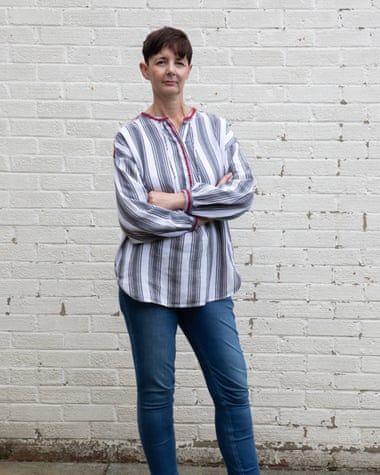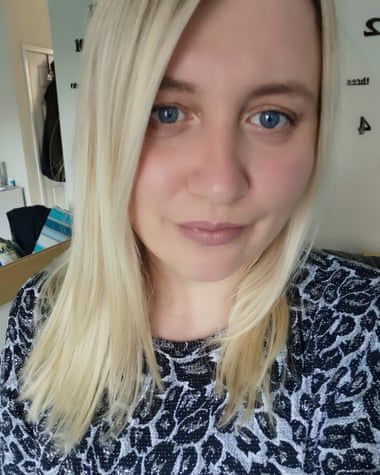
‘I can’t work’: the mothers left to fight alone for their children’s mental health care
Cassandra Leese should have been at the front of the queue when the NHS called on former staff to return to help fight the nascent Covid pandemic in March 2020.
As an ITU-trained nurse, she was exactly the sort of experienced frontline worker the health service desperately needed. But instead of rejoining the ranks, she was housebound.
“[It was] heartbreaking,” she says. “Because I’ve worked in multiple areas of the NHS – I’ve worked in the community. I’ve worked in ITU. I’ve worked across wards. I’ve worked in primary care. I’ve got all the skills and abilities that would have been useful, and I couldn’t even offer voluntary services for helping people vaccinate, because I can’t commit to being able to leave the house.”
What tied Leese to her house wasn’t her own health, but that of her eight-year-old daughter Alice – or rather, the wholesale failure of multiple public services to cater for Alice’s mental health needs.
Leese is one of many parents who are the collateral damage of the funding crises in children’s mental health services (Camhs) and the special needs education (Send) system. The Observer revealed last month that up to half of all children and teenagers referred to mental health, learning disability and autism services in 2019-20 were left without proper support. But the effect on parents is often overlooked – forced to abandon their careers so they can look after their children full-time and fight endless battles with cash-strapped bureaucracies for the most basic support.
Leese had to give up her job as a nurse in early 2019 as Alice’s struggles at school worsened – diagnosed with autism and significant pathological demand avoidance, and with extreme sensitivity to noise, textures and food, she couldn’t cope in mainstream schools.
“She was unable to enter rooms on her own and started flicking lights on and off, showing anxiety about doors being shut, and she became violent when told it was time for school,” says Leese. “Unable to sleep alone. Unable to enter school without huge anxiety. Nightmares. She was waking screaming. Homework caused huge anxiety and behaviours like hiding under blankets shaking.”
On one occasion she was left sobbing under a school table in the foetal position while the rest of the class tried to carry on around her. “That was the point when I realised that forcing her into the school was actually damaging her – and I wasn’t prepared to sacrifice any more of her mental health.”
Alice has gone without regular schooling for two years. Meanwhile, four years after Leese first approached Camhs for an assessment she is still waiting, having been told they won’t see Alice because she is autistic.
Leese has had to shelve her career and rely on benefits. “It got to the point where I was up all night and trying to work all day, and trying to do all the paperwork and manage everything, and I couldn’t do it any more. It was affecting my health massively. And so I gave it all up, which was a really hard decision to make – it was very important to me, and a huge part of my identity was being a nurse.
“We don’t go to parties. We don’t mix with friends and family. I don’t get to go to the supermarket or anything like that. I don’t socialise, I can’t work.”
She has had to fight repeatedly for Alice’s educational needs to be met, as well as securing social care support, disability living allowance, and trying to extract anything from Cahms. She has been to court trying to secure a specialist school placement. She has spent £9,000 over three years paying for private assessments and legal fees.
 Ruth Cliff has spent her savings on fighting for mental health support for her son.
Ruth Cliff has spent her savings on fighting for mental health support for her son.
Ruth Cliff has spent £20,000 in two years on legal support and private assessments for her 17-year-old adopted son, draining her savings and sending her into debt. Her son, who has ADHD, hasn’t attended school since March 2019. She had to go to her GP three times just to get a Camhs referral.
“As a parent of a child who struggles with mental health and with special educational needs you basically have to become the expert, not only of your child and their needs, but also of what needs to be put in place to support them,” says Cliff. “It doesn’t seem that services that are supposed to help will willingly help – you literally have to fight every battle to get them to help you.”
As a self-employed accountant, she is able to work flexibly, but she is left with no time for herself. “I find I do my day job in the evenings and at weekends, because my daytimes are taken up with meetings, preparing for meetings, researching and writing emails, responding to emails, everything – to get either the assessments done or to request assessments. I keep badgering people at the local authority or whichever agency it is I’m trying to get the information and the support from.”
Andrea Ellwood of the campaign group Send Action says parents struggling to access services are often forced to “sacrifice their ability to work and their own wellbeing”.
“When families are most in need of support from mental health professionals and extended services, the barriers and challenges they face seem to come from an unacceptable lack of provision due to funding, resourcing and lack of specialist training. This extends across most needs and disabilities but particularly in delivery of mental health services for autistic young people.”
 Tracey Wilson says the stress of working and caring for he daughter Hannah has led her to speak to the Samaritans.
Tracey Wilson says the stress of working and caring for he daughter Hannah has led her to speak to the Samaritans.
Tracey Wilson lives in a village near Scunthorpe with her 13-year-old son and 17-year-old daughter, Hannah, who has undiagnosed autism and sensory processing disorder. There is no autism diagnosis for Hannah because the Lincolnshire clinical commissioning group (CCG) area has no autism assessment service for 16-18 year olds anywhere in the county. Lincolnshire CCG didn’t respond to a request for comment.
“Most days when I’m not at work, in between dealing with meltdowns and her being upset … I am outside on the phone. I’ve been to a children’s sleep charity, I’ve been to Camhs, children’s services, children’s centre, and the Samaritans for myself,” says Wilson. “And then most of the time I get told I’m not in their area. I can call a place in Scunthorpe 10 miles up the road and be told I’m not in their area.”
Hannah’s condition has deteriorated significantly during lockdown, which Wilson attributes to the lack of support. Her strong academic performance has collapsed and she has started self-harming. “Her leg is shaking, she’s chewing on a [chew buddy] all day – and that’s after her coming down. Before that she was hysterically crying. And then she freezes and she’ll stay in that position for hours, and we aren’t allowed in the room that she’s in,” says Wilson.
“She asks us not to look at her, not to make eye contact with her, not to talk to her. But 90% of the time that she’s awake, she’s in distress. And that’s really hard to see.”
Wilson was forced to take sick leave – but has just returned on reduced hours as sick pay is too low for her to live on. “I’m so riddled with anxiety – first day back at work I was sick, yesterday I was sick, today I was sick. Actually sick, just with worry,” she adds.
“The stress I’m under, I have thought about ending my own life. I went to the doctor straight away of course. But it’s the pain that I feel in my stomach and in my chest having to sit and watch her in the distress that she’s in 90% of the day.”
Rosena Allin-Khan, the shadow mental health minister, said: “Throughout the pandemic, children have been treated as an afterthought by this government, leaving far too many without the support they so desperately need. This has had a disastrous impact on children and their families.
“Parents are losing trust in the system and are fearful for what additional delays will do to the health of their children. It is especially painful to see there is such a postcode lottery in treatment – the experiences of families are truly dependent on where they live, and can add to the anguish if children have to be sent miles away from home for treatment.”
A Department of Health and Social Care spokesperson said: “We are committed to protecting the wellbeing of our children and young people and are investing more than any government to transform mental health services. Early intervention and treatment is vital, and through our long-term plan an additional 345,000 children will be able to access NHS-funded support by 2024.
“At the same time, we’ve invested an additional £500m in our mental health recovery action plan to support those that have been most impacted by the pandemic which will allow around 22,500 more children and young people to access community health services.”
Last month the government also announced funding for autism services, including £10.5m to find ways to reduce diagnosis waiting times for children and young people.
Wilson is unimpressed. “I watched them in the Commons saying by 20-whatever year it was they’re going to have this, this and that done, and how much progress they’ve made. And it was like, if you think you’ve made progress for the pathway into assessments then come to my house and see the state of my child, because I can tell you that you haven’t.
“I would welcome any of the health ministers into my house to look at my child, to spend a day in my shoes, so they can see they’ve not changed anything. Nothing has changed.”










